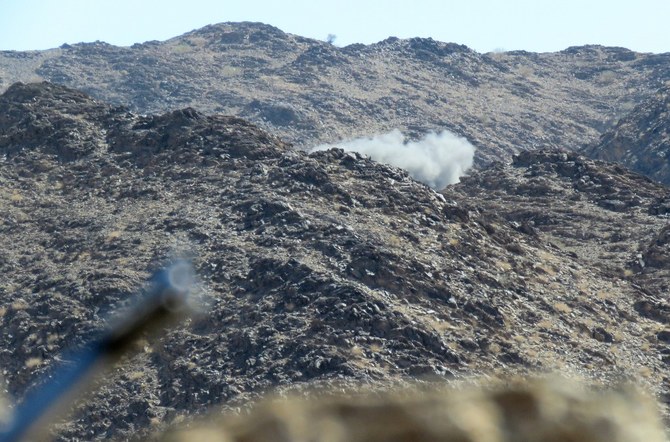AL-MUKALLA: The Arab coalition said on Wednesday it killed 105 Houthi rebels in airstrikes around Yemen’s strategic city of Marib.
The coalition, supporting the internationally recognized government, has claimed the deaths of 2,000 Houthis around Marib in strikes it has reported almost daily since Oct. 11.
“Thirteen military vehicles were destroyed and 105” insurgents were killed in strikes in the past 24 hours, the coalition said, according to the Saudi Press Agency.
The latest bombing was carried out in Al-Jawba, about 50 km south of Marib, and Al-Kassara, 30 km to the northwest.
Marib, capital of the oil-rich province of the same name, is the internationally recognized government’s last bastion in northern Yemen.
The UN Security Council last week called for “de-escalation” in Yemen, in a unanimously adopted statement to counter “the growing risk of large-scale famine” in the country.
Meanwhile, a group of EU diplomats visiting the port city of Aden, the interim capital of Yemen, has expressed support for the internationally recognized government of Yemen, hailed its return to Aden, and called upon the country’s political forces to accelerate the full implementation of the Saudi-brokered Riyadh Agreement.
The EU delegation also urged the Iran-backed Houthis to end their deadly offensive in the central province of Marib and engage with peace efforts to end the war in Yemen.
The delegation includes the deputy head of the EU mission in Yemen, Marion Lalisse, French Ambassador Jean-Marie Safa, German Ambassador Hubert Jaeger, Dutch Ambassador Peter-Derrek Hof, and Swedish Envoy for Yemen Peter Semneby.
“The EU ambassadors welcome the return of the Yemen government to Aden, express full support for the government and call for the full implementation of the Riyadh agreement,” the mission said in a statement.
The EU delegation touched down in Aden airport on Tuesday and then headed to the presidential palace for a meeting with Yemen’s Prime Minister Maeen Abdul Saeed.
The official news agency SABA reported that the prime minister told the EU envoys that the Houthis are spoiling efforts to end the war by aggressively attacking internally displaced people in Marib and civilian targets in Saudi Arabia.
He called for the Houthis and their supporters in Iran to be punished for undermining peace and security in Yemen.
“The terrorist behavior of the Houthis, their war crimes against civilians and IDPs in Marib, and the attack on civilian properties in Saudi Arabia test the international community,” Saeed said.
“Peace process should be based on effective pressure and sanctions on the Houthis and their sponsors in Tehran,” the premier said, urging international donors to expand their assistance to Yemen to include supporting the country’s exacerbating economic meltdown.
Yemen’s Foreign Minister Ahmed Awadh bin Mubarak, who also met the delegation, said that the Europeans discussed offering assistance to the economy and to help alleviate the humanitarian crisis.
“There is great European interest in discussing ways to support the Yemeni government, especially in the economic field,” Bin Mubarak said.
The Dutch ambassador to Yemen said they held an “excellent” meeting with the government and discussed ways to help address the devaluation of the riyal, fight corruption and tackle other economic challenges.
“Excellent meeting today with @Yemen_PM in Aden, expressing EU support for the Government of Yemen and discussing the economic challenges including the exchange rate, inflation, boosting revenues, the needed government reforms and the fight against corruption,” Peter Derrek Hof said on Twitter.
During a meeting with the EU delegation on Wednesday, Aden Gov. Ahmed Hamid Lamlis thanked the Europeans for visiting Aden, stressing that the visit carries a message that the city is safe and ready to receive international delegations.
The Europeans also discussed the implementation of the Riyadh Agreement and supporting the government to smoothly resume its duties in Aden with the leader of the pro-independence Southern Transitional Council Aidarous Al-Zubaidi.
Yemeni officials and experts believe that the EU mission visit to Aden would spur the implementation of the Riyadh Agreement, help the government function effectively in Aden and convince many international diplomats to visit the city.
“This is an indication that Aden is safe. The presence of the Europeans in Aden mounts pressure on parties to put into place the Riyadh Agreement and end hostilities in the city,” Najeeb Ghallab, undersecretary at Yemen’s Information Ministry and a political analyst, told Arab News.



























